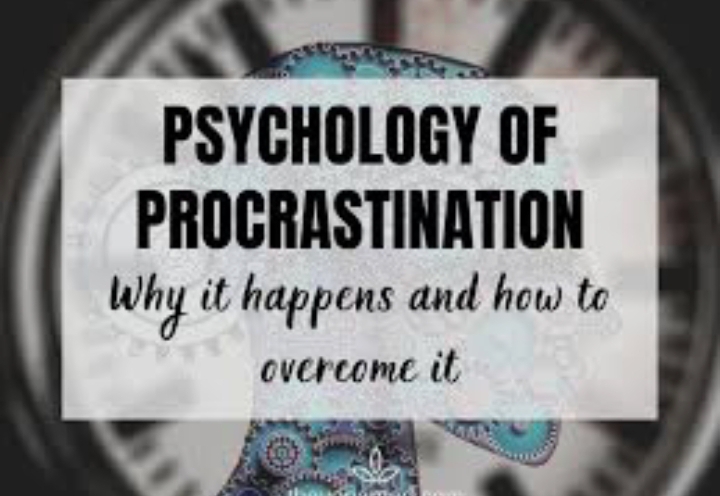
The Psychology Behind Why We Procrastinate and How to Stop
Procrastination is a universal phenomenon that affects nearly everyone at some point. Whether it’s delaying a project at work, postponing a personal goal, or avoiding mundane chores, procrastination can have a significant impact on our productivity and well-being. But why do we procrastinate, and how can we overcome this pervasive habit? This blog explores the psychology behind procrastination and offers actionable strategies to break free from its grip.
Understanding Procrastination
At its core, procrastination is the act of delaying or postponing tasks, often to the point of experiencing stress or negative consequences. Unlike simple laziness, procrastination is a complex psychological behavior influenced by various cognitive, emotional, and situational factors.
1. The Role of Immediate Gratification
One of the primary reasons we procrastinate is our brain’s preference for immediate gratification. Known as “time inconsistency,” this concept explains why we often prioritize short-term pleasures over long-term benefits. When faced with a task that feels challenging or tedious, our brains naturally seek out easier, more enjoyable activities, such as scrolling through social media or watching TV.
2. Fear of Failure
Fear of failure is another significant driver of procrastination. When a task feels overwhelming or when success seems uncertain, we may delay starting to avoid confronting potential failure. This fear often stems from perfectionism, where the pressure to perform flawlessly can lead to paralysis rather than action.
3. Decision Fatigue
Procrastination can also result from decision fatigue—the mental exhaustion that comes from making too many decisions. When our cognitive resources are depleted, we’re more likely to defer tasks that require significant effort or planning.
4. Lack of Motivation
Tasks that lack intrinsic motivation or personal relevance are particularly susceptible to procrastination. Without a clear connection to our goals or values, it’s easy to push these tasks aside in favor of activities that feel more meaningful or rewarding.
5. The Impact of Stress and Anxiety
Stress and anxiety can exacerbate procrastination, creating a vicious cycle. Avoiding a task might provide temporary relief, but the looming deadline often increases stress levels, making it even harder to start.
The Consequences of Procrastination
Procrastination can have far-reaching effects on our lives, extending beyond missed deadlines and last-minute scrambles. Chronic procrastination can lead to:
- Reduced Productivity: Delaying tasks often results in rushed, lower-quality work.
- Increased Stress: The constant pressure of unfinished tasks can lead to heightened stress and anxiety.
- Damaged Relationships: Procrastination can strain personal and professional relationships when others are affected by our delays.
- Negative Impact on Mental Health: Over time, procrastination can contribute to feelings of guilt, inadequacy, and low self-esteem.
How to Overcome Procrastination
Breaking the cycle of procrastination requires understanding its underlying causes and adopting targeted strategies. Here are some evidence-based techniques to help you take control:
1. Set Clear Goals
Having clear, specific goals can provide direction and motivation. Break larger tasks into smaller, manageable steps to make them less daunting. For example, instead of “Write a 20-page report,” start with “Draft the introduction.”
2. Use the “Two-Minute Rule”
The two-minute rule is a simple yet effective strategy: if a task takes less than two minutes to complete, do it immediately. This approach helps build momentum and reduces the mental burden of small tasks.
3. Leverage Time Management Techniques
Effective time management can counteract procrastination. Methods such as the Pomodoro Technique (working in focused intervals with short breaks) or time blocking (allocating specific periods for tasks) can improve focus and efficiency.
4. Address Fear of Failure
Combat fear of failure by reframing tasks as opportunities for learning rather than tests of competence. Embrace a growth mindset and remind yourself that mistakes are a natural part of progress.
5. Create a Conducive Environment
Eliminate distractions and create an environment that supports productivity. This might involve decluttering your workspace, turning off notifications, or using apps designed to block distracting websites.
6. Develop Self-Compassion
Being overly critical of yourself for procrastinating can be counterproductive. Instead, practice self-compassion. Acknowledge your feelings without judgment and focus on what you can do to move forward.
7. Build Accountability
Sharing your goals with a friend, mentor, or accountability partner can provide external motivation. Regular check-ins can help keep you on track and reinforce your commitment to completing tasks.
8. Visualize Success
Visualization can be a powerful motivator. Imagine the sense of accomplishment you’ll feel upon completing a task and how it will positively impact your life. This mental rehearsal can make the end goal feel more tangible and attainable.
9. Reward Progress
Celebrate small wins along the way to maintain motivation. Rewards don’t have to be extravagant—even simple acts like taking a break or treating yourself to a favorite snack can reinforce positive behavior.
10. Seek Professional Help
If procrastination is severely impacting your life, consider seeking guidance from a therapist or counselor. Cognitive-behavioral therapy (CBT) and other interventions can help address underlying issues and develop healthier habits.
Final Thoughts
Procrastination is a deeply ingrained habit for many, but it’s not insurmountable. By understanding the psychological factors behind it and applying targeted strategies, you can take meaningful steps toward greater productivity and personal growth. Remember, overcoming procrastination is a journey, not a destination. Be patient with yourself, and celebrate the progress you make along the way.
Breaking free from procrastination isn’t just about getting more done—it’s about reclaiming control over your time and living a more fulfilling, purpose-driven life. Start today, even if it’s just a small step. The future you will thank you.
Leave a Reply